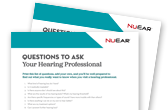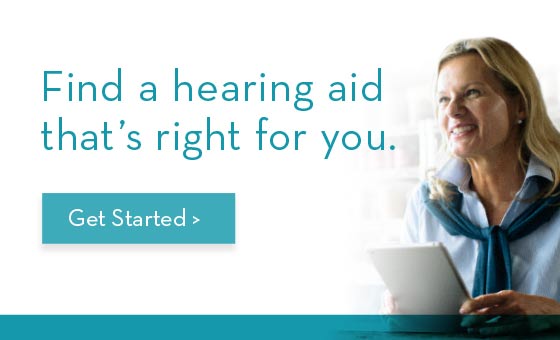Hearing Loss FAQ's
-
How can I recognize hearing problems?
Most of the time hearing problems begin gradually, without discomfort or pain. What's more, family members often learn to adapt to someone’s hearing loss, without even realizing they are doing it. Here are some questions to ask yourself to determine whether you have hearing loss:
- Do I often ask people to repeat themselves?
- Do I have trouble following conversations with more than two people?
- Do I have difficulty hearing what is said unless I'm facing the speaker?
- Does it sound like other people are mumbling or slurring their words?
- Do I struggle to hear in crowded places like restaurants, malls and meeting rooms?
- Do I have a hard time hearing women or children?
- Do I prefer the TV or radio volume louder than others?
- Do I experience ringing or buzzing in my ears?
If you answered yes to several of these questions, chances are you do suffer from hearing loss.
-
If I had hearing loss, wouldn’t my doctor have told me?
Not necessarily. Only about 14% of physicians routinely screen for hearing loss.1 Since most people with hearing impairments hear just fine in quiet environments (like your doctor's office), it can be very difficult for your physician to recognize this problem. Only a trained hearing professional can determine the severity of your hearing problem, whether or not you could benefit from a hearing aid, and which type would be best for you.
1. Source: MarkeTrak 8
-
What are the most common causes of hearing loss?
There are several causes. The main ones include excessive noise, infections, genetics, birth defects, infections of the head or ear, aging, and reaction to drugs or cancer treatment.
-
Are there different types of hearing loss?
Yes. There are three types of hearing loss:
- Sensorineural: The most common type, it occurs when the inner ear nerves (and hair cells) are damaged and do not properly transmit auditory signals to the brain. Can be treated with hearing aids.
- Conductive: Is typically the result of obstructions in the ear. Can usually be treated medically or surgically.
- Mixed: A combination of sensorineural and conductive.
-
Is there any way to make it easier to hear people wearing face masks?The use of face masks and social distancing is proven to reduce speech audibility, as well as eliminate important lip-reading cues, both key to understanding speech. Hearing aids — and features like our Edge Mode and Mask Mode — help offset speech audibility loss in numerous ways and can help make it easier to hear people who are wearing masks.
-
Are there hearing aids for single-sided hearing loss?
Yes, hearing aids are available for those with single-sided hearing loss. The NuEar CROS System delivers solutions for:
- Those who are unable to hear in one ear and have normal hearing in the other ear (CROS)
- Those with little to no hearing in one of their ears, and a hearing loss in their better ear (BiCROS)
CROS Solution
If you’re unable to hear in one ear and have normal hearing in the other ear, you may benefit from a CROS solution. You’ll be able to hear sounds in your weaker-hearing ear by way of your healthy ear.How it works:
To help you better engage in all types of listening environments, our CROS solution has a microphone that picks up sounds and voices from your weaker-hearing ear, then transmits them to a hearing aid receiver that’s fitted on your good ear. No matter your position at the dinner table, or if sounds originate from your weaker-hearing side, you won’t miss important sounds around you.BiCROS Solution
A BiCROS solution is also available and can benefit those with little to no hearing in one of their ears, and a hearing loss in their better ear.How it works:
This option sends sound from a microphone, placed in your ear with little to no hearing, to a hearing aid receiver placed in your better-hearing ear. This allows you to hear from both sides. Your hearing care professional can help you determine what solution will best fit your needs and lifestyle.Learn more
-
Doesn’t hearing loss only affect old people?
Hearing loss can occur at any time, at any age. In fact, based on standard hearing examinations, 30 million people in the United States that are 12 years or older has hearing loss in both ears.1
1. Source: Archives of Internal Medicine
-
Are there operations or medications I can take for hearing loss?
Only a small percentage of hearing loss in adults can be improved with medication or surgically. The vast majority of Americans with hearing loss are treated with hearing aids.
-
Who treats hearing loss?
- Audiologists are professionals with a master's degree, Au.D. or Ph.D. in audiology, the study of hearing. They specialize in testing, evaluating and treating hearing loss. An audiologist may also fit hearing instruments.
- Hearing Aid Dispensers are trained in fitting and dispensing hearing aids. Hearing aid specialists are often state-licensed and board-certified to test for hearing loss and to fit consumers for hearing aids.
- Otolaryngologists specialize in the diagnosis and treatment of ear, nose, throat, head and neck disorders. Also known as ENT doctors.
-
If I think I have a hearing problem, what do I do?
You should make an appointment with a hearing professional like an audiologist, hearing aid specialist or ENT doctor for an evaluation, consultation and hearing test. Many hearing care professionals offer this evaluation at no charge.
-
How do I find a hearing professional?
When seeking treatment for hearing loss, be sure to select a hearing professional who understands the available technology and offers follow-up care. Use our online locator to find a professional near you.
-
Won’t wearing a hearing aid make me stand out?
While you are no doubt concerned about appearance, compensating for a hearing loss by asking people to repeat themselves, inappropriately responding to people (or not responding at all), or even withdrawing from social situations is more obvious than wearing a hearing aid.
Today’s hearing aids are small, discreet and more stylish than ever before. Some are even invisible. And, chances are that once you have a hearing aid, your quality of life will improve so much that cosmetics won't be as much of an issue for you.
-
How will a hearing aid improve my quality of life?
Research on people with hearing loss and their significant others has shown that hearing aids play a significant factor in a person's social, emotional, psychological and physical well-being.
More specifically, treatment of hearing loss has been shown to improve1:
- Communication in relationships
- Intimacy and warmth in family relationships
- Ease in communication
- Earning power
- Sense of control over your life
- Social participation
- Emotional stability
When you consider all the benefits of better hearing, you can see that hearing aids hold great potential to positively change your life.
1 Source: www.betterhearing.org -
How do hearing aids work?
At their most basic, hearing aids are microphones that convert sound into electrical signals. An amplifier increases the strength of the signal, then a receiver converts it back to sound and channels it into the ear canal through a small tube or earmold. A battery is necessary to power the hearing aid and to enable amplification.
-
Will a hearing aid restore my hearing?
While no hearing aid can restore your hearing to normal (except in cases of very mild hearing loss), our hearing aids are designed to let you hear soft sounds that you couldn't hear before, and prevent loud sounds from becoming uncomfortably loud for you. They are also designed to improve your ability to understand speech, even in noisy environments.
-
Will I be able to hear in noisy places?
While no hearing aid can filter out all background noise, our advanced hearing aids are designed to reduce some types of background noise so that you can enjoy conversation and improve communication in places like restaurants, business meetings and social gatherings.
-
What are the different types and styles of hearing aids?
Today’s hearing aids come in a wide variety of sizes and styles — from those that sit behind the ear to completely invisible hearing aids — and feature different technology levels to match your specific needs and budget. Visit our Find Hearing Aids section to see for yourself.
-
How do I know which hearing aid will be best for me?
There are several factors that will determine which hearing aid will be the right one for you. They include the nature and severity of your hearing loss, your lifestyle and the activities you regularly enjoy, your job, your eyesight and dexterity, and the size and shape of your outer ear and inner ear canal. You can start with our Hearing Aid Finder Tool, though ultimately your hearing professional should advise you as to the best choice for you.
-
What are some advances in hearing aid technology?
Like many other high-tech devices (TVs, phones, computers), hearing aids have experienced a major technological revolution in the past decade and especially in the last few years.
The best of today’s hearing aids are designed to track body and brain health; virtually eliminate feedback; make listening in noisy environments easier and more comfortable; stream stereo sound from TVs and radios directly to the hearing aid itself; let you talk on your phone hands-free; and much more. All in instruments that are smaller (in some cases, invisible) and more comfortable, rechargeable and powerful than ever before.
Compare your current hearing aids with today's latest technology.
-
Is there an adjustment period to wearing hearing aids?
Yes. Most people need an adjustment period of up to four months before becoming acclimated to — and receiving the full benefit of — wearing their hearing aids. However, you should expect to notice obvious benefits during this trial period.
-
Will I need a hearing aid for both ears?
Two-ear hearing (called "binaural") is better than one. If you have hearing loss in only one ear, you may be fine with one hearing aid. Age- and noise-related hearing loss tend to affect both ears, but your hearing profile for each ear is probably different. If there is a loss in both ears, you will probably benefit more with a binaural solution. Today, about two-thirds of new users opt for dual hearing aids, and as a group they report a higher level of satisfaction than purchasers of a single hearing aid.
-
How much do hearing aids cost?
The price of a hearing aid will vary depending on the specific model and features you need, and how effective it is in various noise environments. Whatever the final cost, most hearing professionals do offer financing plans. You should also check to see if you qualify for free hearing aids or discounted hearing aids from your employer, union, the Veterans Administration, insurance provider, HMO or local charity (such as Lions Club).
-
Are cheap hearing aids any good?
Inexpensive models are simply hearing amplifiers that will make everything louder (including all the ambient noises around you). They will not, for example, separate human voices from background noises, or hear directional sounds like today’s more sophisticated hearing aids are designed to do.
-
Is there a guarantee with hearing aids?
Yes. In fact it was NuEar, powered by Starkey Hearing Technologies, that first introduced the 30-day money-back guarantee, which is now the industry standard. But it is important to give yourself a reasonable chance to adjust to your hearing aid, knowing it often takes a few months to get comfortable.
-
Should I consider purchasing a hearing aid online?
We believe that you achieve the best possible results with your hearing aids by consulting with a hearing professional in person, so we do not endorse retailers selling over the Internet. Read our policy regarding Internet sales.
-
What is a lithium-ion rechargeable battery?
NuEar offers rechargeable hearing solutions that are powered by a lithium-ion battery. Learn more about the lithium-ion batteries that allow rechargeable hearing aids to last longer than other systems.



